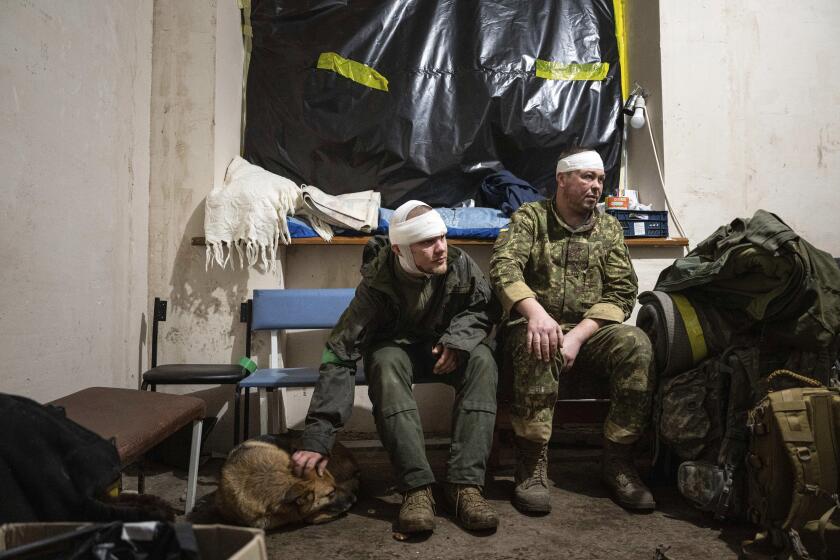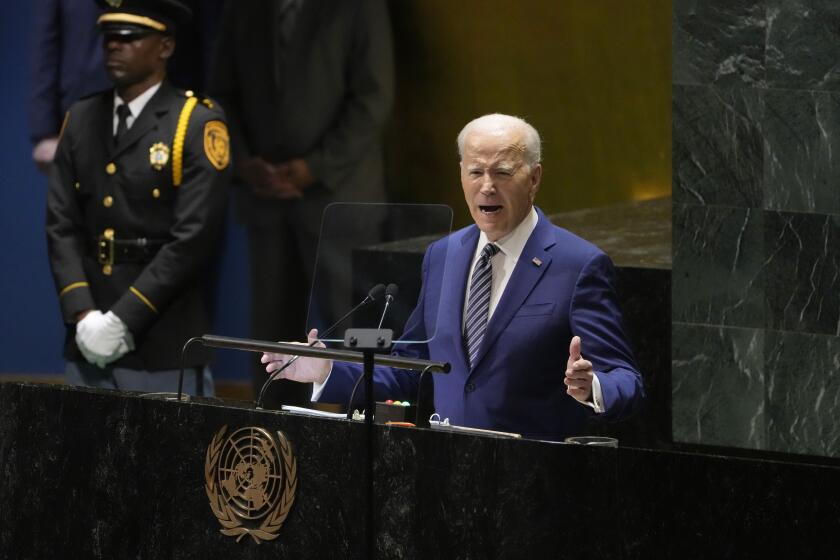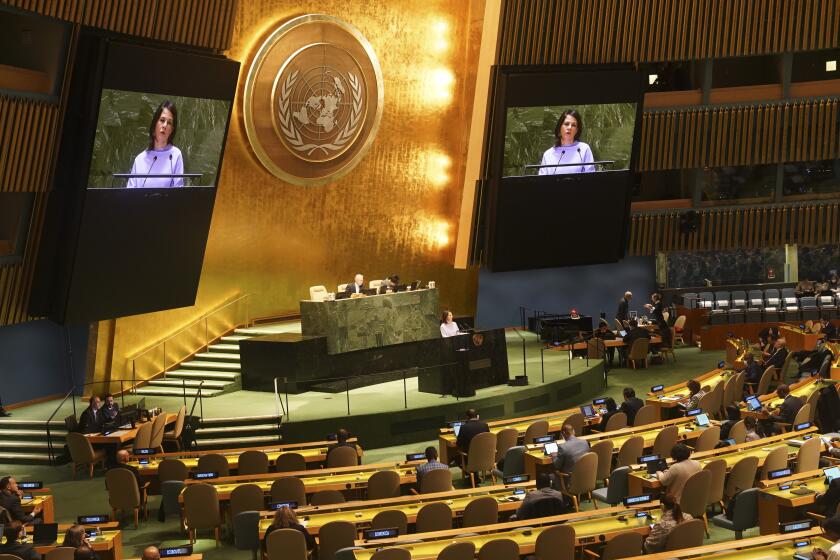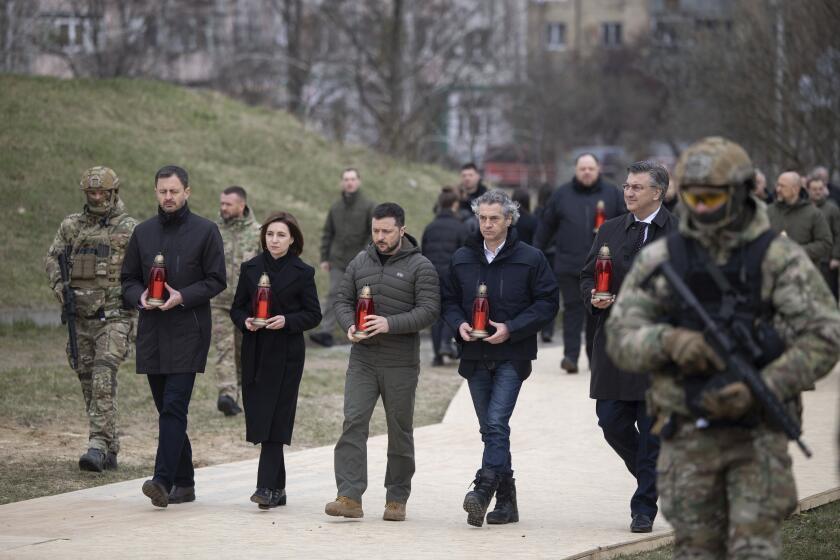Russia is defeated in its bid to regain a seat on the U.N.’s top human rights body
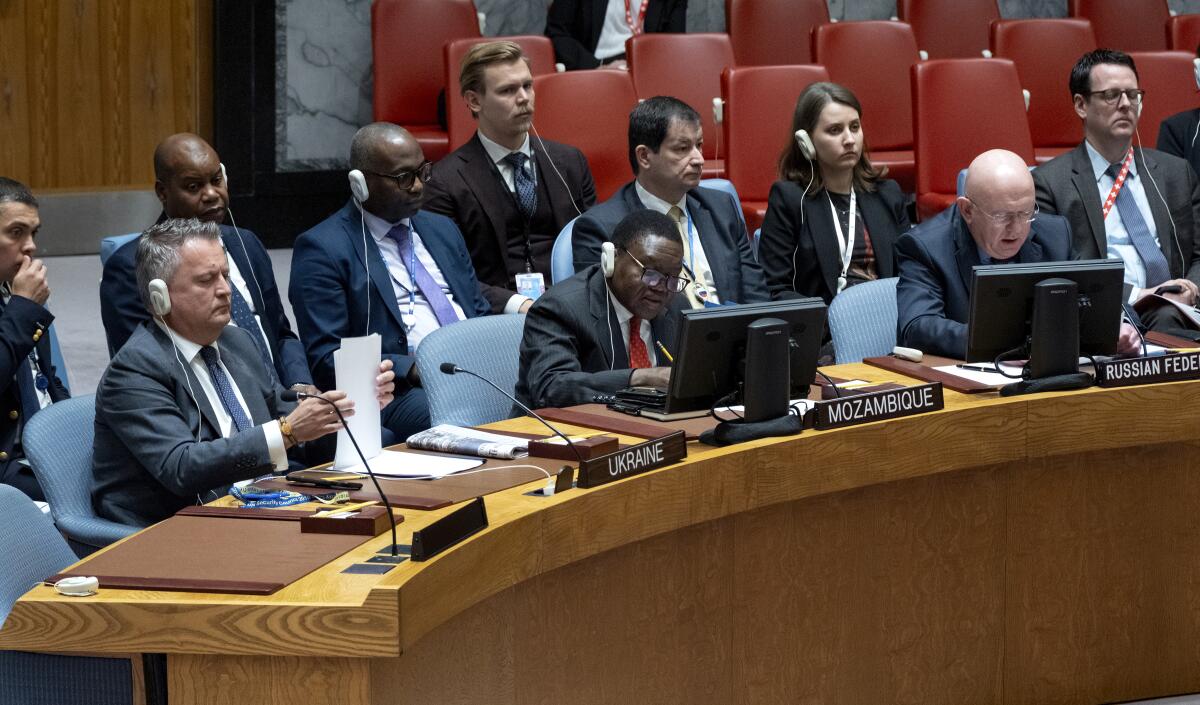
- Share via
UNITED NATIONS — Russia was defeated in its bid to regain a seat in the U.N.’s premiere human rights body by a significant majority in Tuesday’s election in the General Assembly, which voted last year to suspend Moscow after its invasion of Ukraine.
Russia was competing against Albania and Bulgaria for two seats on the Geneva-based Human Rights Council representing the East European regional group.
In the secret ballot vote, Bulgaria got 160 votes, Albania received 123 votes and Russia just 83 votes.
Russia has claimed that it has support from a silent majority, and even though 83 votes came from less than half the 193 U.N. member nations, there is certain to be a concern, especially by Ukraine and its Western allies, that Moscow’s support was that high.
The only other competitive race was in the Latin America and Caribbean group, where Cuba, Brazil and the Dominican Republic defeated Peru for three seats. New York-based Human Rights Watch said Cuba didn’t deserve a place on the council because of systematic rights violations, including harassment, arbitrary detention and torture of dissidents, but Cuba got the highest number of votes of the four countries — 146.
The United Nations chief says Russia’s full-scale invasion of Ukraine has triggered ‘the most massive violations of human rights’ in the world today.
The other closely watched race was in the Asia group, where four countries — China, Japan, Kuwait and Indonesia — were candidates for four seats. Some rights groups also campaigned against Beijing and the size of the vote was closely watched.
Indonesia topped the ballot with 186 votes followed by Kuwait with 183 votes and Japan with 175. China was last with 164 votes.
Human Rights Watch said last week that China’s rights record should disqualify it from the Human Rights Council. It pointed to last year’s report by the office of the U.N. human rights commissioner that said China’s discriminatory detention of Uyghurs and other mostly Muslim ethnic groups in the western region of Xinjiang may constitute crimes against humanity.
Two other regional races were also not competitive.
For the four African seats, Malawi got 182 votes followed by Ivory Coast with 181 and Ghana with 179. Burundi, whose rights record was also strongly criticized by Human Rights Watch, was last with 168 votes.
At the United Nations, Biden and Zelensky sought to convince developing nations weary of a protracted fight in Ukraine to continue global support for Kyiv.
The two Western seats were also uncontested, and the Netherlands topped France with 169 votes, compared with 153 votes.
But the spotlight in this election was on Russia and its campaign to get back on the Human Rights Council.
Moscow’s U.N. ambassador, Vassily Nebenzia, accused the United States on Monday of leading a campaign to prevent Russia’s return to the council.
“The main phobia of our American colleagues today is electing Russia to the Human Rights Council,” Nebenzia told a Security Council meeting called by Ukraine on last week’s strike by a Russian missile on a Ukrainian soldier’s wake in a small village that killed 52 people.
The United States and others sent letters to many of the 193 members of the General Assembly urging a vote against Russia, according to diplomats. Felice Gaer, director of the American Jewish Committee’s Jacob Blaustein Institute for the Advancement of Human Rights, was among the nongovernment letter-writers also urging Russia’s defeat.
The United Nations General Assembly has passed a nonbinding resolution calling on Russia to end hostilities and withdraw its forces from Ukraine.
At Monday’s council meeting, Albania’s U.N. Ambassador Ferit Hoxha also urged those who care about human rights and “the credibility of the Human Rights Council and its work” to oppose a country that kills innocent people, destroys civilian infrastructure, ports and grain silos “and then takes pride in doing so.”
U.S. Deputy Ambassador Robert Wood told the Security Council that Russia’s reelection to the Human Rights Council “while it openly continues to commit war crimes and other atrocities would be an ugly stain that would undermine the credibility of the institution and the United Nations.”
In April 2022, less than two months after Russia’s invasion of Ukraine, the General Assembly voted 93 to 24 with 58 abstentions on a U.S.-initiated resolution to suspend Russia from the Human Rights Council over allegations that its soldiers in Ukraine engaged in rights violations that the U.S. and Ukraine called war crimes.
New York-based Human Rights Watch urged U.N. members to deny a seat on the rights council to Russia, saying its forces in Ukraine continue to commit apparent war crimes, including unlawful attacks, and crimes against humanity such as torture and summary executions. President Vladimir Putin and his children’s rights commissioner are also sought by the International Criminal Court for the unlawful deportation of Ukrainian children, it said.
Independent U.N.-backed human rights experts say they have evidence of war crimes committed by Russian forces in the fight against Ukraine.
The Human Rights Council was created in 2006 to replace a commission discredited because of some members’ poor rights records. But the new council soon came to face similar criticism, including that rights abusers sought seats to protect themselves and their allies.
The council reviews the human rights records of all countries periodically, appoints independent investigators to examine and report on issues such as torture and situations in countries such as North Korea and Iran. It also sends fact-finding missions to investigate rights violations, including in Ukraine.
Under the council’s rules, its 47 seats are allocated to regional groups to ensure geographical representation. Members are elected yearly by the General Assembly for staggered three-year terms that begin Jan. 1.
In last year’s election, Venezuela, South Korea and Afghanistan lost contested races, but countries including Vietnam and Sudan, which have been accused of having abysmal human rights records, won seats.
More to Read
Sign up for Essential California
The most important California stories and recommendations in your inbox every morning.
You may occasionally receive promotional content from the Los Angeles Times.
